To make things easier, here’s a downloadable checklist that you can use to implement these steps effortlessly.
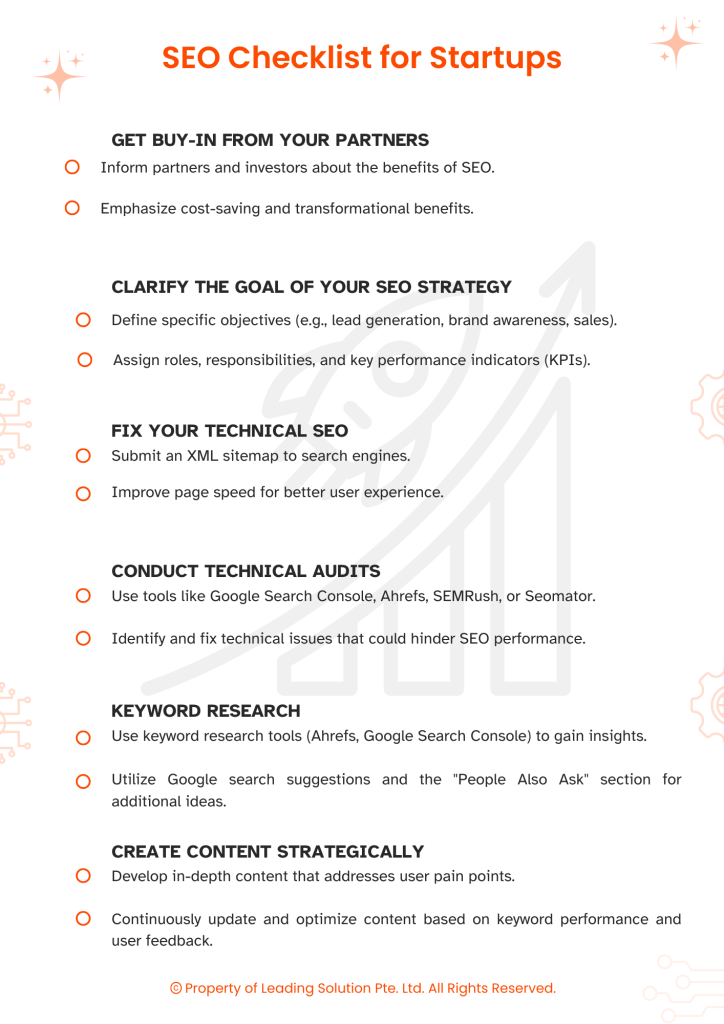
Running a startup is a challenge. As a founder, the lack of structure, the uncertainties, and the challenge with funding are critical factors that keep you up at night. Success will require hard work and strategy. In today’s world, you need visibility through SEO for a startup company.
How else can you build brand awareness and attract investors? A good product or service is essential. But if no one knows what you do, why you do it, and your value proposition, you may struggle.
And yes, you can choose the easy way and go for paid ads, but remember the financial constraints? There has to be a solution. Thankfully, you can go organic with SEO for startup businesses.
What is SEO for Startup
Search Engine Optimization (SEO) is a set of strategies to improve a website’s visibility and search engine rankings. It can include technical configuration, content creation, on-page optimization, and link building. As a new business owner, it is important to include this as part of your strategy as it can attract customers with little to no costs. For more in-depth reading on search engine optimisation, visit this article.
Difference Between Startup SEO and Regular SEO
In a practical sense, there is no difference. But you are starting from scratch. So, you require more work. Google does not know or care if you are a startup. It is only interested in:
- Quality of content: Your content should be unique, relevant, and aligned to search intent.
- Accessibility: Is your site crawlable? Search engines need to be able to access your page to rank them.
- User experience (UX): Is your website fast and easy to navigate? Is it mobile-friendly? Google takes user experience very seriously, and so should you.
- Optimization: This is about all the ingredients that make you searchable, like relevant keywords, content readability, search intent alignment, and a strong backlinks profile.
- Engagement: If the users spend more time on your page, it is a positive signal to Google that they like your content and enjoy the experience.
Google wants to see the same thing from you as it wants from a large corporation. But the scale of the challenge is more daunting for you. First, you lack the resources of an established business. Secondly, your website is new and does not have adequate content to be considered an industry authority.
Also, as a startup, you will deal with financial constraints. Hence, you can’t afford to splurge on all the fancy tools. So, SEO for a startup is only different in terms of the scale of work as you are starting from the ground up.
Benefits of SEO for Startup Website
If you intend to convince your partners about search engine optimisation, what would you tell them? Here are ways it can benefit startups.
Increased visibility: One major challenge for startups is a lack of visibility. Nobody knows your brand, product, or service. And you lack the financial capacity to run advertisements. Implementing search engine optimisation can gradually get your brand in front of people.
Better ROI: It costs less than traditional marketing and paid digital ads. The ROI is also better because users are looking for you instead of you looking for them.
Lead Generation: You want to attract potential customers at the start of their customer journey and nurture them until they are ready to buy from you. Search engine optimisation helps you jumpstart that process.
Improved credibility: Your reputation is a valuable business currency while search engine optimisation helps you enhance it. With a strong reputation, you can attract more partners and investors.
Improves User Experience: Let’s face it, the business exists to solve the user’s problems. Implementing SEO for startup business will enhance your customer’s experience.
Effective SEO Tips for Startups
Here are actionable strategies that could help bring in more visitors to your website.
Get Buy-in From Your Partners
The reason for this is the unique management structure of a startup. You may have co-owners, angel investors, investors, and partners who need to be informed about the plans and strategies of the business.
With this structure, you cannot unilaterally make decisions. Hence, you must sell the idea to your partners and management. Inform them of the benefits of search engine optimisation for your startup, and let them know of the cost-saving and other transformational benefits. Once you obtain buy-in, you are good to go.
Clarify the Goal of Your Startup SEO Strategy
Your strategy is your approach to implementing the steps that will improve your organic search engine rankings. Clarify the strategies and define your goals.
It could be lead generation, brand awareness development, sales, or all. List the things you want to achieve with your strategies, as that will help you measure your performance and make improvements where necessary.
As part of this process, assign roles and responsibilities, along with the KPIs you wish to track.
Fix Your Technical SEO
This deals with your website’s back end. It includes but is not limited to:
- Optimizing your site architecture.
- Submitting your sitemap
- Implementing SSL
- Optimizing page speed
- Creating an XML sitemap
- Adding breadcrumbs menus
- Utilizing robots.txt and,
- Setting a URL structure.
No matter how useful, valuable, and well-written your content is, if a search engine cannot crawl it, most people will not see it.
So, technical search engine optimisation is critical and requires the best hands. You can always run a technical audit to detect any issues. You can use Google Search Console, Seomator, Ahrefs, and SEMRush for audits.
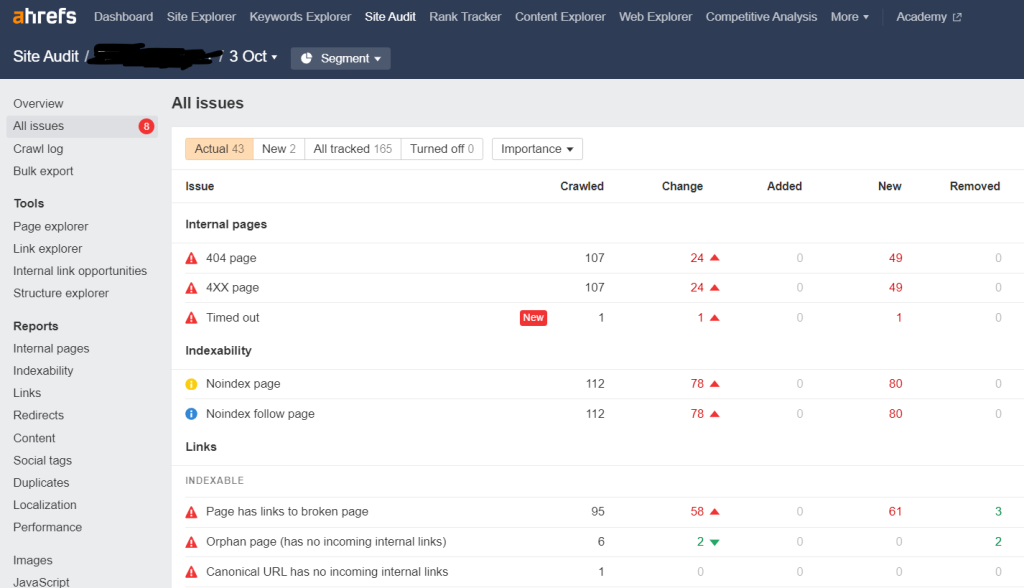
Spend considerable time here to ensure you get it right. This is the foundation of an SEO strategy for startup business, and as such, you cannot get it wrong.
Keyword Research
Keyword research is about understanding the search terms your potential target would use to search for your product or service. Understanding these terms will help you create content to answer their questions. There are several ways to do keyword research, but here’s the thing. The Google search engine is perhaps the most powerful tool for keyword research. Type in a phrase, and it will show you a list of related search terms.

You can find more related search terms within the ‘People Also Ask’ section and at the bottom of the page. Here’s what you need to do:
- Draw a list of potential keywords that are relevant to your business.
- Consider the terms your customers might use to find you.
- Consider your product names or services.
- Include industry-related phrases.
- Add location-based keywords, if applicable.

Look at it from your user’s perspective. Refer to your user persona and consider the pain points. Then, brainstorm with your team. Next, use relevant keyword research tools to expand your list. These tools will give extra insights like search intent, search volumes, keyword difficulty, related keywords, and backlinks profile of ranking pages. You can choose from several tools like Moz, Ahrefs, Google Search Console, or Semrush.
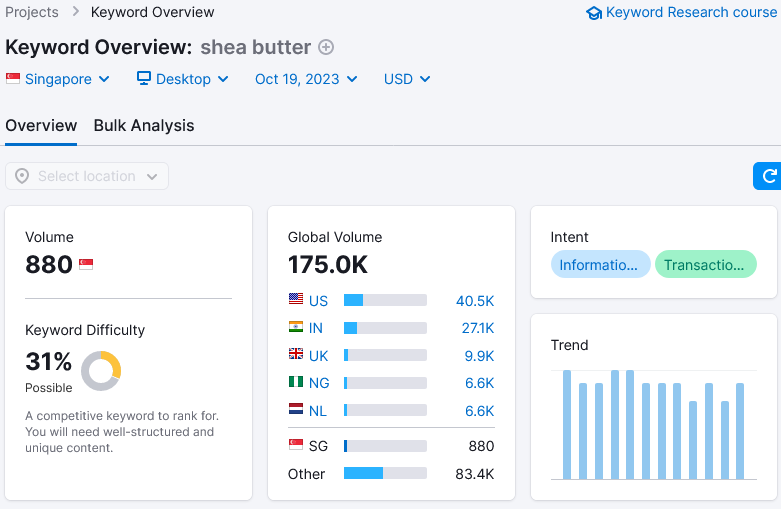

Next, select the most relevant and realistic keywords. Consider the keyword difficulty and search volumes. Also, review the related keywords to see if you can rank for them. Avoid selecting competitive keywords because large organizations are targeting or ranking for them.
Finally, develop your topical map. The topical map helps you cover a topic in-depth. Google recognizes you as an authority when you cover a topic in-depth.
So, create topic clusters to show how you will link to various pieces of content. Once you arrive here, you are ready to take things further with content creation.
SEO-friendly Content Creation
The next step in your strategy is to create high-quality, unique, and valuable content. If you’re within budget, you can consider looking for third-party companies that offer content creation services so that your energy is focused on more important tasks. Your content should answer your audience’s questions and solve their problems, but how can you do that unless you know your audience?
Understand Your Audience
Start with an audience persona. An audience persona is a semi-fictional representation of your target audience. Start by:
Identifying your target audience & researching their demographics
This includes:
- Gender
- Age range
- Occupation/Industry
- Stage of life
- Location
- Cultural Influences
Analyze their psychographics
Psychographics deal with the emotional and human side of your customers like:
- Fears: These are the things that worry your potential customer.
- Pain Points: What frictions are they facing?
- Goal: These are the things they want to achieve.
- Needs: These deal with anything that takes them closer to their goals.
Once you have all this in place, humanize it by giving it a name and picture. At this point, you are clear about the customer’s needs.
Define Content Type
What type of content would be suitable for your audience? It depends on the platform they use and the search intent.
If your audience hangs out on YouTube, focus on video content. If they are young and like bite-sized videos, TikTok is suitable. If they seek information and prefer text content, turn your attention to your blog. To learn more about how you can use SEO for your blog, check out this article.
Note that your audience can use many channels at the same time. In that case, your content creation must assume a multi-channel approach.
Plan Content Creation
Content planning is critical because you don’t want to be bogged down. It also simplifies things for your team and makes you more efficient. Assign your topics and keywords. Create a template or guide, and assign tasks. Then, set milestones and deadlines.
Next, research topics and create a calendar. You can use Semrush for your topic research. Finally, write your content, edit, proofread, and save on your content management system.

Optimize SEO for Startup Websites
After writing and saving the content on your content management system, optimize it by linking to authoritative external sources and relevant internal content. Place your keywords in the right places, like titles and headers.
Next, write a concise meta description, meta title, and slug. The slug is the ending part of your URL after the forward-slash (/). It should be your keyword separated by a dash (-). For example, www.site.com/benefits-of-shea-butter. Finally, write an alt text for your images and ensure you incorporate your primary keyword. Proofread again, and you are good to go!
Build Links
If you sift through many content, you would have heard that backlinks are the most important search engine ranking factor. While that information is not from Google and cannot be verified, backlinks remain a critical factor.
A backlink is a link from an external source that points to your website. Google sees them as votes. The more of these ‘votes’ you have, the stronger you are to Google. Here’s our complete guide on backlinks and how they work.
Earning backlinks is tricky. But you can do it by creating valuable content, guest posting, and reaching other companies via cold email outreach. You can also buy backlinks, but be careful and verify the source. Irrelevant and spammy backlinks will do more harm than good.
Monitor Your Performance
Here’s something to understand about implementing SEO for startup companies. See it as a marathon rather than a sprint. It takes time to see the results. In the meantime, set up Google Search Console and Google Analytics to enable you to track performance. Be aware of the latest startup SEO trends so you can update or adjust your strategy.
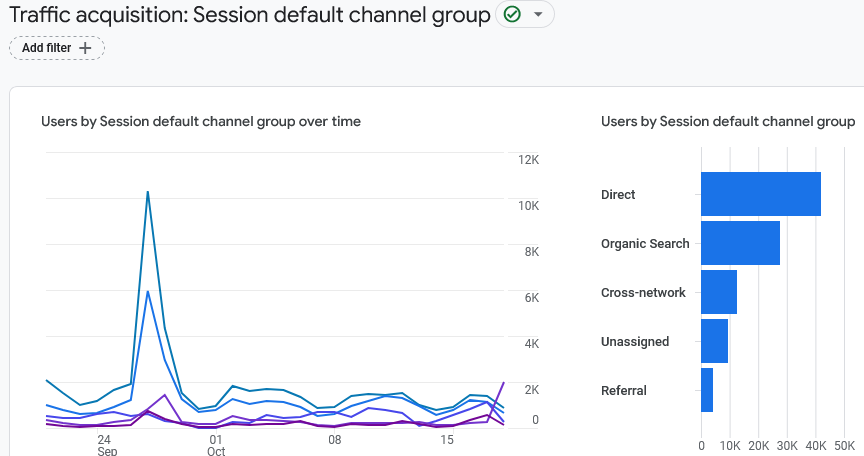
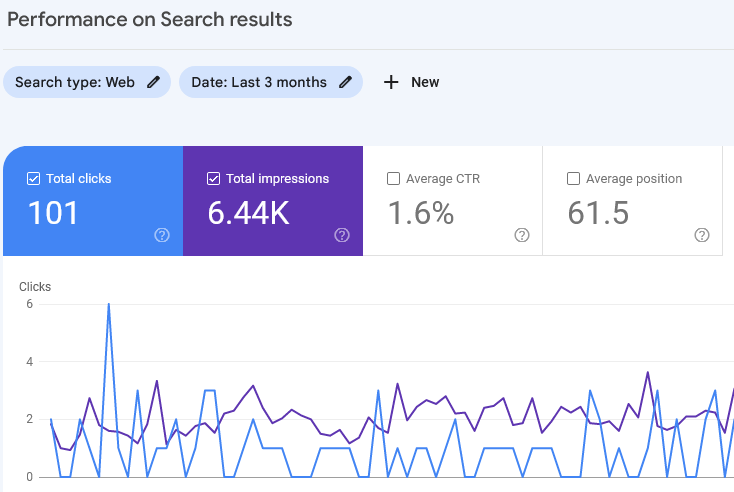
Tracking performance will help you understand what you are doing right and what you need to improve.
Overtake Your Competitors With SEO Services For Startups
The challenges of building a startup are enormous. The business environment is fast-paced, there is a ton of work to do, and resources are tight.
However, you will get ahead of your competition if you invest early in SEO for a startup company. Considering the technical nature of the task, you want this handled by a capable digital marketing agency that provides affordable startup SEO services with proven results such as Leading Solution. Engage in our effective SEO services for startup companies now, get a free quote, and start your journey to organic search dominance.
Compare the various models to find the best fit for your business needs and budget. For more details on our SEO packages and how we can help your business grow, visit The Leading Solution’s SEO Packages.
At Leading Solution, we specialize in delivering exceptional digital marketing services tailored to your unique needs. Whether you’re seeking an experienced SEO agency for top-tier SEO services or a trusted partner for e-commerce SEO, our team is here to help. We also offer local SEO services to boost your visibility within your community and web development expertise to create stunning, functional websites. Explore our SEO packages in Singapore to find the right solution for your business goals. Let’s work together to achieve success online.
Check out the PSG marketing grant in Singapore and learn how it can help you reduce your digital marketing costs by 50% and see the best SEO agencies in Singapore for all your SEO needs.


